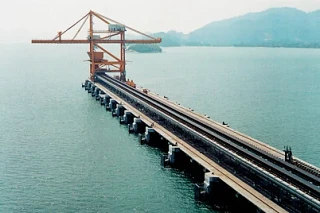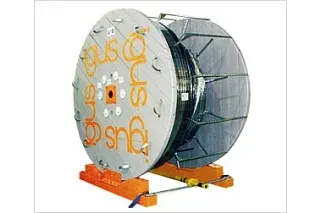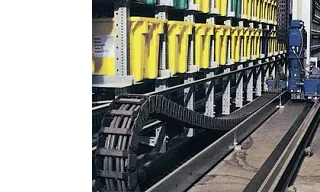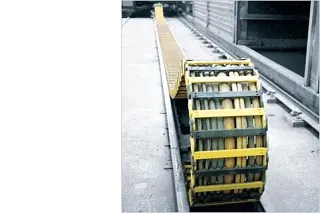Change Language :
Design: Gliding, Long Travel Cable Carrier Applications
Long travel applications

Cable carriers guide and protect moving cables and hoses at low to high speeds, over long and short distances, in all axes, and in a wide range of different applications all over the world.
Over the years, cable carrier manufacturers have increasingly pushed the envelope in terms of higher speeds, longer distances and heavier loads. Cable carriers are an extremely low maintenance solution and can withstand extreme conditions, such as low or high temperatures, harsh weather conditions, sea water, chemical exposure, and more.
Cable carriers offer a longer service life and increased system reliability due to superior technology in comparison to cable reels or festoons, for example. They also save on installation space and can reduce the length of cable required by more than 50%. No additional drives or control systems are required.
10 advantages for long travel applications with cable carriers

There are 10 key ways in which cable carriers can benefit your long travel application:
- Travels over 1,312 ft possible (igus® Rol-E-Chain)
- Gliding speeds up to 16.4 ft/s
- Service life of 10 years and more
- Many different types of cables and hoses can operate side by side in the same system
- Space-saving installation
- Quiet operation
- High accelerations
- Durable despite wind, weather, dirt, and chemical exposure
- Modular system is easy to assemble
- Cables and hoses can be rapidly retrofitted
The gliding principle
This principle comes into play whenever a long travel application is involved. This is because, for long travels, the upper run of the cable carrier nests on the lower run. The upper run glides partially on the lower run and partially at the same height on a glide bar.
The illustrations below show the gliding application principle. For lateral guidance, a guide trough is necessary. If the stationary mounting bracket and the fixed end of the cables and hoses can be placed in the center, the cable carrier length is calculated as follows:
Cable carrier length: Lk = S/2 + K
- S = length of travel
- R = Bending radius
- HRi = Trough inner height
- HF = Required clearance height
- K2 = Further add-on if the mounting bracket location is set lower
- K = Pi R + "safety" - add-on for bending radius (K is taken from the data tables of the individual igus® Series)
- D2 = Over length for long travels, gliding
Guide troughs
A guide trough is an important element in long travel applications. The height of the trough must be at least twice the total chain link height and the sides should provide a chamfered opening. When the upper run cannot glide on the lower run, glide bars must be installed along the sides of the trough.
igus® recommends the use of polymer glide bars, because they are optimally matched to its cable carrier material and achieve the lowest values in terms of friction, noise and wear.
Important: When assembling the trough parts, the following points must be given particular attention:
- Properly align all trough parts upon installation
- All screw heads should be flush with the trough
- Smooth leveled transition between the end of the chain and the glide bars
- Solid connection with the glide surface
Travel speeds and accelerations

Automated storage/retrieval system with System E2 cable carrier and chainflex® cables - travels up to 262 feet and speeds of 14.8 ft/s
Travel speeds up to 16.4 ft/s in continuous operation are possible and exist on current applications. In special cases, even higher speeds are possible.
For example, igus® E4/100 and E4/4 energy chains achieve speeds of 72 ft/s and accelerations of 2,572 ft/s in crash test units.
Acceleration plays a large role in the calculation. Differentiations must be made between normal operational acceleration and a sudden jolt of acceleration, such as unexpected stops.
Service life
Cable carriers with 656 ft travels have been in operation for 8 years with minimum maintenance*. Cable carriers travelling up to 197 ft have been in operation for 12 years with almost no maintenance*.
*Source: igus test laboratory
Technical environment

igus® E4 cable carrier in a pre-cast concrete plant with dust and concrete sediment.
Long travel applications can run in water, in dirt, in the tropics, in explosion risk areas (if they have certain special design features, such as material suitable for electrostatic-discharge applications) and many other conditions.
Guide troughs are also available in corrosion-free materials.
Test results
igus® uses tests to determine:
- push-pull forces under both ambient and extreme temperatures, humidity, and dirt;
- cable carrier friction values, alone and against various glide services;
- behavior of electrical cables under push-pull conditions;
- behavior of hydraulic and media hoses under push-pull conditions;
- service life, and noise generation.
Before choosing to work with a cable carrier supplier, decide if some or all of these points are applicable to your application and gather the related test data to compare before you move ahead with procurement.
Conclusion
Cable carriers can achieve longer travels, higher speeds and withstand heavier loads and harsher conditions today than ever before.
For additional help or advice with your long travel application, contact us directly at 1-800-521-2747 or e-mail sales@igus.com
Useful Links
Discuss your project with an expert
Whether you're interested in end-to-end, fully assembled solutions or looking to build your own customizable project, let us assist you with a solution based on your specific application and requirements. Contact us via the form below or call us at (800) 521-2747 to discuss your project today!



